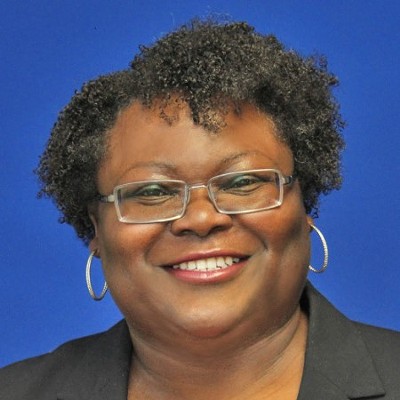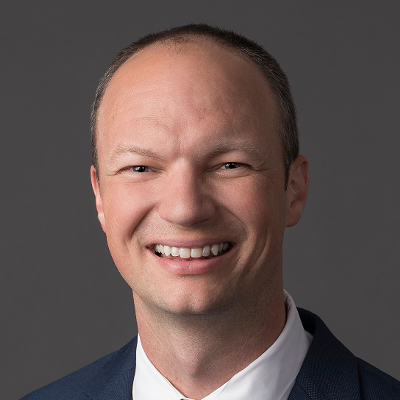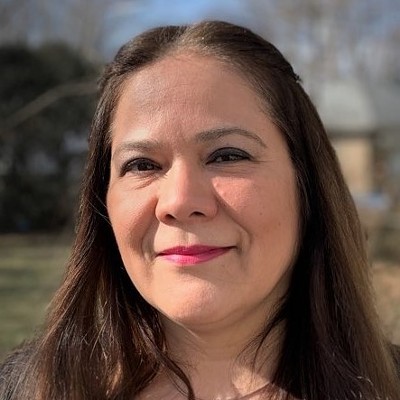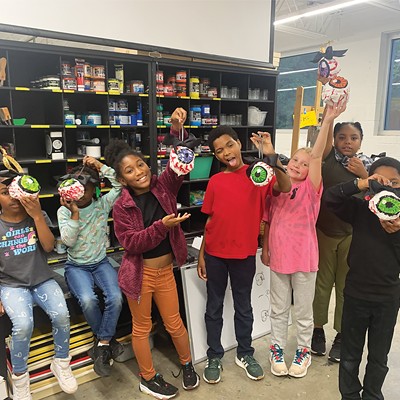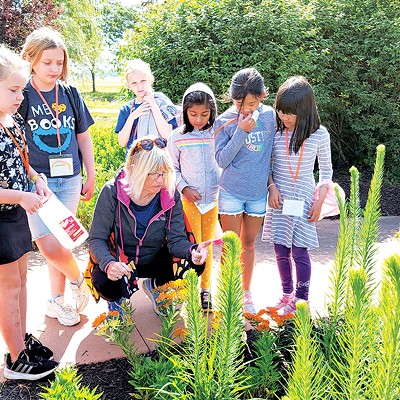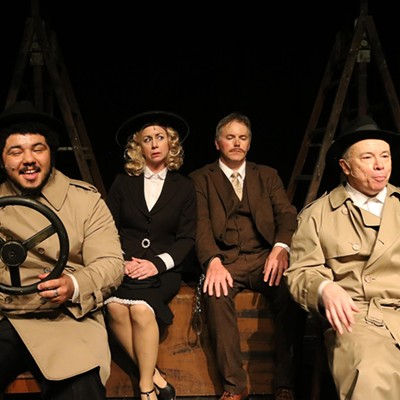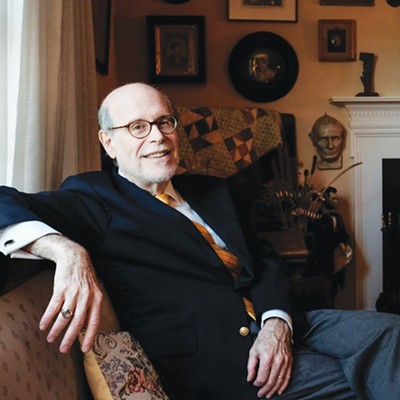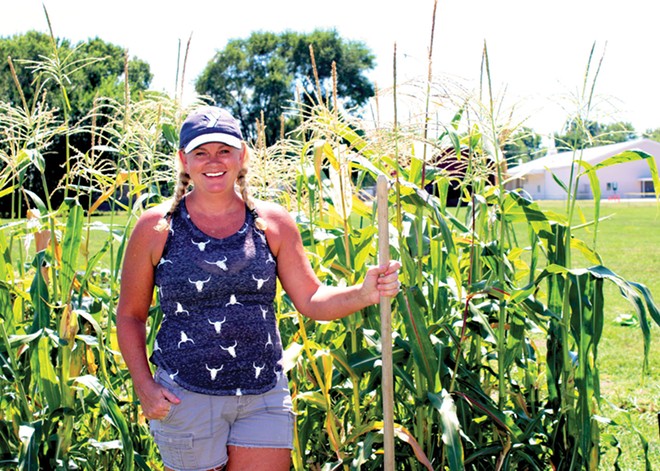
"I can't work on a vaccine, but I can give what I have," says Cecelia Wendler, a Springfield resident who has been regularly fulfilling requests posted to the Springfield Families Helping Families Facebook (SFHF) group. "It's the immediacy of stepping in; it's very in-the-moment. It gives a sense of the lived concern for everyone in our community."
Since mid-March, new programs and funding sources have been rolled out through the city, state and federal governments, offering various forms of assistance to business and individuals. Around the same time, United Way of Central Illinois and the Community Foundation for the Land of Lincoln partnered to create a COVID-19 Response Fund. To date, more than $900,000 has been awarded in grants to dozens of nonprofits, including numerous food banks.
Yet hundreds of individuals have also stepped forward to offer assistance to others in need, often to people they don't know. Some givers and receivers connect through social media, while micropantries and Little Free Libraries allow both donors and recipients to remain anonymous.
Wendler says, "Watching the SFHF group over the last six months is what gives me hope. All of this movement of help, all over the city."
We're all in this together
Scott McFarland, Springfield District 186 school board president and executive director of the nonprofit Serve Illinois, created the Springfield Families Helping Families Facebook group soon after schools closed in March. Now at nearly 13,500 members strong, the much-touted group has met hundreds of essential need requests.
Katharine Eastvold, one of the initial members, thought it was a great idea and signed on to help moderate. She also helps to recruit volunteers and deliver food boxes.
Eastvold stresses that the group's purpose is not to fill requests, but rather, serves as "a platform for mutual aid. People are used to programs where organizations provide services. This is a far older form of helping each other," she said. Members of the group post requests, while anyone who can meet the need will grant the request. Often, members both give and receive.
"I feel the main reason people are in this group is that it helps people feel like they aren't alone. There are a lot of people who've not needed help before," explains Eastvold, noting that group members often encourage one another. "There's this feeling of 'we're all in this together.'"
Cecelia Wendler is a former critical care nurse and currently a professor at the Springfield campus of University of Illinois Chicago's School of Nursing. At the beginning of the pandemic, her brother offered some advice: "If it is possible for you to be generous, it is time to be insanely generous." Wendler took that as a radical call to action, although she says, "My efforts are small, compared to those who spend all their time helping others."
Wendler decided to focus her efforts on meeting two main needs, in addition to purchasing toiletries and sanitary items for micropantries. When formerly homeless people find housing but are in need of everything, she finds out their favorite color and purchases new, luxurious bath towels, then includes a gift card for the person to purchase other items.
Another effort is marking children's birthdays, sending cards with a crisp $1 bill for every year of their age. "It's a very small contribution, but it means a lot to me. I like to help kids feel special," she says.
"It gives me hope," says Wendler, of watching the interactions within the group.
Micropantries make a major impact
Lynn Ehmen, a Springfield mother of four, began working with micropantries after joining SFHF. At first, she fulfilled requests to deliver food, which led to making the 150-mile roundtrip drive to Dot Foods in Mt. Sterling on a weekly basis to fill her van with donations for distribution to micropantries.
She then joined forces with the nonprofit OpenWorld Relief to be able to accept donations, which to date has netted more than $17,000. Marine Bank locations serve as collection points for people who want to make a monetary donation. Ehmen has used those contributions to purchase materials to build 11 micropantries throughout Springfield and food to fill them.
Currently numbering two dozen, micropantries are available in all areas of the city and are filled with food and household supplies such as sanitary and hygiene products. Micropantries are refilled by volunteers daily, or sometimes even multiple times a day. Unlike traditional food pantries, micropantries are accessible by anyone with a need, 24 hours a day, no documentation required. Everything operates on the honor system.
More than five months into the pandemic, Ehmen says the biggest issue she sees is that there are more people with needs than there are volunteers to help keep the pantries filled.
"We try to get sponsors for each micropantry to fill it each day, but it's not enough. We need people who live around the pantries to pay attention and help stock them. We could help a lot more people if we had more help," she said.
Community volunteer and Enos Park resident Tiffany Lapp has added micropantries to her impressive list of volunteer efforts. From April through June, Lapp purchased items and filled three pantries, twice a week. "We all understand that there are people out there with needs," Lapp said. "Circumstances can change dramatically overnight."
Since the stay-at-home order was lifted, Lapp concentrates her efforts on filling the micropantry at Lanphier High School, closest to her home, once a week. Lapp says, "The micropantries are an excellent way to help out. Beyond food, paper products are very helpful: cleaning products, diapers, wipes, feminine products, toilet paper, dish detergent," noting that SNAP cannot be used to purchase these types of items.
Growing community gardens
When Ehmen was stocking the micropantry at Washington Middle School in early March, she happened to take a walk around the building and saw the big lawn behind it.
"Can you believe this?" she says with a sweep of her arm. "I knew I had to plant it." She called friends to help till and plant, and the Washington Middle School Community Garden was born.
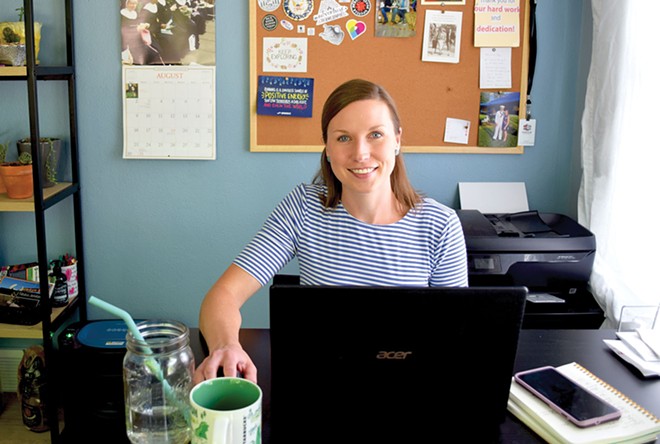
Though community gardens throughout Springfield have different rules concerning harvesting – some for volunteers only, some for neighborhood residents only – the Washington Middle School Community Garden is free and open to the public. Any leftover produce goes to fill the micropantry in front of the school as well as other micropantries throughout Springfield.
Ehmen says that she has been gardening since childhood, as her family always had a large garden. After experiencing the death of a parent when she was a young child, her family was on the edge of homelessness for a time, which has filled her with a deep empathy for the struggles of others. "There but for the grace of God, go I," she states.
Alana Reynolds, founder of Grow Springfield, an organization that encourages community gardening and urban farming, has helped coordinate the Butler Elementary School Garden for several years. Though not open to the public for harvest, the garden normally plays an integral role in school life, with produce used in curriculum for the 350 students, and an after-school program encouraging students to harvest and cook.
Since schools have closed, the Butler Elementary School Garden has been donating produce to the Boys and Girls Clubs of Central Illinois in the form of community garden shares. Thirty families get fresh bags of produce each week. Another school garden that is open to the public is the Spartan Garden at Southeast High School. Garden manager Kayla Worker says, "Every summer, it's open to the community to harvest. Come anytime."
When schools closed in March, the garden managers adapted accordingly. "We normally try to plant unusual things for the kids to try, but this year we planted more traditional foods for feeding people," says Worker. Two large beds full of greens have been a staple all summer long.
The nearby micropantry is stocked multiple times each day, and while hardier produce that can handle the heat is left in the micropantry, they rely on the community to harvest produce from the gardens themselves. "Everyone is welcome," Worker says.
COVID-19 is highlighting a need for local food systems, says Michael Clark, an instructor at Lincoln Land Community College and founder of Ecofluent. "We need to bring renewable food sources to the community that are available without asking for it," says Clark.
This year, Ecofluent has focused on providing and planting 32 fruit trees at area schools and community gardens, free of charge. Ecofluent is currently working with the city of Springfield to purchase vacant lots in hopes of planting more gardens that would be accessible to the community.
"We (need to) build resilience for crisis response so that we have a local source for food and basic needs to be met. We shouldn't have hunger in the United States," says Clark.
Katharine Eastvold of SFHF agrees with the efforts toward decentralized and more accessible food distribution, noting that there is not a shortage of food available, but challenges in how people can get food.
"Delivery of services to where people are needs to be more systematic," she says. "We have daily needs for delivery of food bags and boxes. We need to reimagine how we make it available to where the people are. We need more concerted efforts to bring food to different neighborhoods, to break down barriers."
Many students rely on school food
When schools closed in mid-March, Springfield District 186 continued to provide breakfast and lunch for students during the week via distribution sites, but some parents were not able to access the prepared meals for their children due to lack of transportation. According to the most recent data available, more than 55% of students in the district are considered low-income.
Though she does not have children, Megan Philpot of Springfield became aware of the acute need for meal delivery through SFHF. She began delivering to a few families at first, but very soon the need became more than she could personally fulfill. Philpot recruited a dozen volunteers to deliver more than 200 District 186 meals a day to students throughout the spring and summer.
Philpot also took in donations to provide for weekend meals. "There was no other way to get this done except to do it yourself," she says.
Working remotely with United Service Organizations, a job with a flexible schedule, has been key in Philpot's volunteer efforts. She says the desire to help others was ingrained in her as a small child.
"Growing up, my family's mindset was, if we can help people, we should. It is important to help when we are in a fortunate situation, and we hope people can help us if we are in an unfortunate situation."
Many of the volunteers Philpot has recruited were surprised to see the poverty and dire needs families endured even before COVID-19 came into the picture. "We all live in our bubble, and you don't recognize how other people live. We were very surprised, and sometimes it was sad. But at least the kids were being fed," says Philpot.
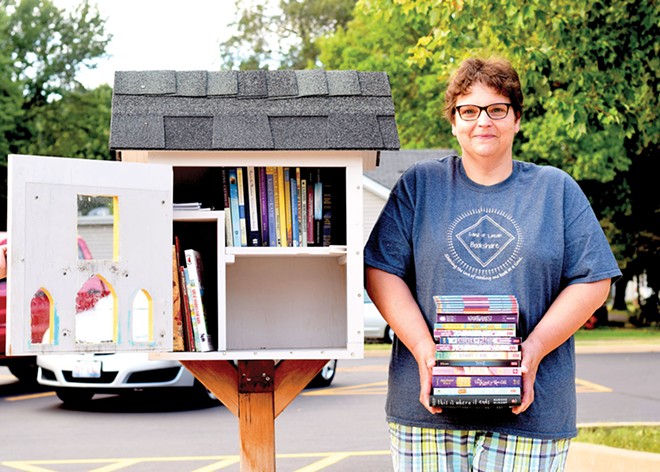
In addition to the volunteers and recipients that Philpot coordinated through SFHF, a tremendous group effort took place among Springfield District 186, Springfield Immigrant Advocacy Network, Regional Office of Education, Compass for Kids, Matheny-Withrow Elementary School, parent educators and dozens of community volunteers to serve additional meals. Families in need had to be identified, meals prepared and packaged, distribution points set up throughout the district and delivery routes mapped out for families who were unable to pick up food. The school district prepared 12,000 to 13,000 meals each day.
Deliveries to students will begin again after Labor Day, and Philpot says there is "a huge need" for additional volunteers throughout the school year.
Food pantries struggle
While people in need have traditionally relied on food pantries for assistance, established food pantries throughout the nation have been hit hard. Many have seen a sharp increase in requests even as donations have declined and supply chain issues have led to distribution challenges.
"From March through July 2020, Central Illinois Foodbank distributed nearly one million more pounds of food, the equivalent of approximately 833,000 meals, compared to the same time frame last year," states Jane Kiel, finance director at the Foodbank.
Sharon Brown, executive director of Kumler Outreach Ministries, says, "In March, our pantry was inundated due to job layoffs and schools shutting down." In a few weeks' time, the demand leveled off as schools were able to pivot to provide food for kids at home and people began receiving Pandemic EBT (Electronic Benefits Transfer, formerly known as food stamps).
However, an uptick in demand for food has recently begun, due to unemployment benefits decreasing and the gap between the school district's summer food assistance program and meals provided during the regular school year.
Unlike some food pantries, Kumler was not affected by supply chain issues, as the pantry normally keeps several weeks of food on hand. Central Illinois Foodbank also provided assistance, as the Foodbank was able to access nonperishable staples with aid through the federal CARES Act.
Donations, however, "are down significantly," says Brown, noting that they were not able to hold neighborhood food drives on a monthly basis throughout the summer as they normally would, due to concerns about COVID-19.
The Eastern Illinois Foodbank, serving 18 counties in Eastern Illinois, experienced several supply chain issues such as delivery delays, price increases and a decrease in most types of donations at the beginning of the pandemic, according to Gavin Gordon, assistant inventory manager. At the same time, there was a significant increase in demand.
"During the month of April, we saw close to a 50% increase in new clients," says Gordon. "The biggest change has been in the way we and our partner agencies distribute food. Most have moved to a pre-boxed, drive-through distribution model. It keeps everyone safe, but it does not allow for as much client choice."
A different kind of hunger
In addition to micropantries, community volunteer Tiffany Lapp has another passion: books. As a board member of the nonprofit Northside Children's Community Library, she spends a lot of time collecting donated books and redistributing them.
Over the winter, Lapp learned that the Citizens FBI Academy was co-sponsoring Little Free Libraries in the form of a rebate for people who purchased a ready-made one. Lapp and her husband Jeff, an FBI employee, ordered one through the national website and were waiting for the ground to thaw to install it in their yard.
"When the stay-at-home order started, I realized the need to put it in a centralized location rather than my front yard," said Lapp. "I got permission to put it up next to the micropantry at Lanphier."
The Little Free Library movement has been around for over a decade, usually with homeowners erecting a weatherproof container in their front yard. A similar concept to micropantries, a Little Free Library provides 24-hour access to books, free of charge, without fines or returns. Currently, there are more than 100,000 Little Free Libraries in over 100 countries, with millions of books changing hands.
With many public libraries closed and children home from school, Little Free Libraries have been a boon to communities. There are now more than 30 Little Free Library locations in Springfield, with more added all the time.
Lincoln Park resident Debbi George says, "I've always wanted a Little Free Library, so I asked my husband to build me one for my birthday." She asked her favorite artist, Felicia Olin, to paint it for her with whimsical characters and says she's had a very positive response. "I thought in these difficult times, since the libraries weren't open, this would be a good idea."
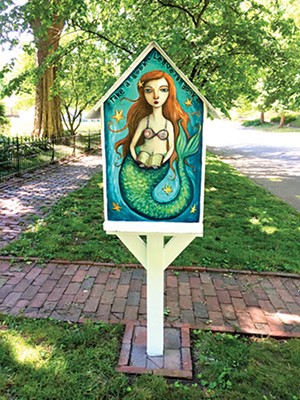
Land of Lincoln Bookshare is a nonprofit started in 2017 by best friends Tina Carnes and Tiffany Roe. Their aim is to collect donated books and redistribute them to Little Free Libraries, students and the public at large through events such as farmers markets, festivals and craft shows. The pandemic has cut off many of their normal avenues of distribution. Normally, the organization distributes 300-500 books each week, but with an oversupply of donations, the women have had to take a break from accepting book donations.
"We've been filling libraries around town all summer. We did a lot of porch drop-offs in the beginning of the pandemic. We recently donated almost 500 kids' books to Cherry Hills Baptist Church for their book fair. We've dropped off books at nursing homes. We've had to get creative," says Carnes, of their efforts to put books into the hands of those who need them.
A Little Free Library on the west side of Springfield made the news last summer when it was set on fire. "Quite a few popped up after that. It became more well-known, and neighborhoods stepped up in response," states Carnes. The website littlefreelibrary.org has a searchable map, as well as instructions for individuals who want to build or purchase a ready-made Little Free Library.
With few events resuming yet, Land of Lincoln Bookshare has been distributing a couple of hundreds books every week through Little Free Libraries at locations in Springfield and beyond. "We're bringing books to the neighborhoods," says Carnes. "It allows people to gain access to resources, especially in book deserts. Books are essential."
A generous community
Despite the hardships of the last few months, one benefit that has emerged from the pandemic has been an increasing awareness and connection
between those in the community who have means and those who do not. As there continues to be a societal movement to recognize and acknowledge privilege, direct forms of assistance provide a way for people to go the extra step and use their privilege to benefit others. Groups such as SFHF have become a platform where marginalized and privileged groups can meet, and in some cases, those who give assistance also receive assistance.
In her role as a moderator for SFHF, Eastvold says, "I have learned a lot about resources and needs." She feels that the group has raised awareness of how many families lack reliable transportation, helping those who have means to realize that there can be barriers for those in need, even when assistance is available.
"It's not always easy to access social services. I've seen a lot of those moments where people realize there can be a lot of difficult steps for people," says Eastvold.
Lapp says, "I should have been a statistic," when asked about her volunteer efforts, which total more hours each week than a full-time job. "But I wasn't. There were lunch ladies, art teachers, librarians who showed they cared about me. The kindness is a big deal," she says of her own difficult childhood.
Audrey Bessette, a mother who has both given and received help through SFHF, says, "The things I see people do for other people in need, it makes my heart feel so good."
"I'm not really surprised at the generosity of this community," says Eastvold. "I have experienced this as a very generous, very giving community. It's been incredible seeing it happen through SFHF."
Carey Smith, a Springfield resident, is a mother and gardener who tries to pay forward the kindness and generosity she has received in her life.


